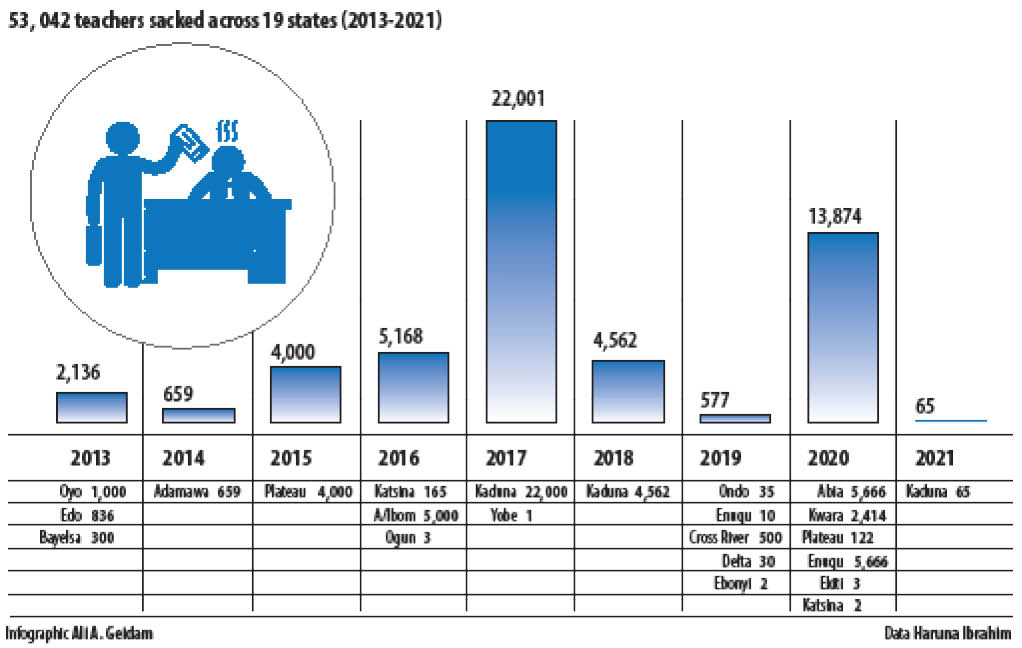… 53,042 sacked in 8 years
One of the problems that appear to have defied solution in the Nigerian education system is the shortage of qualified teachers.
While the basic schools are struggling to meet up with the needs of their pupils and students considering the few teachers available, many teachers are being sacked by governments for low qualification, illegal recruitment and fake certificates among others.
Recently, the Kaduna State government sacked 65 primary school teachers alleged to have been recruited illegally.
Though that was not the first time teachers were sacked in Kaduna, the state has a reputation of sacking teachers in large numbers over poor qualifications.
The state had in 2017 laid off 22,000 teachers for failing an aptitude test. The sacked teachers reportedly failed to score 75 per cent in a primary four examination the state set for them to test their academic abilities.
Governor Nasir el-Rufai had said: “The hiring of teachers in the past was politicised and we intend to change that by bringing in young and qualified primary school teachers to restore the dignity of education in the state.”
While Kaduna State is not the only state that has sacked teachers, Daily Trust checks showed that in the last eight years, 53,042 teachers have been sacked in 19 states of the federation over poor qualification, illegal recruitment and fake certificates among others.
The breakdown showed that in 2021, Kaduna State sacked 65 teachers over illegal recruitment; in 2020, Abia sacked 5,666 for illegal processes; Kwara sacked 2,414 for lack of qualification; Plateau, 122 for fake certificates; Enugu, 5,666 for been illegally recruited; Ekiti, three for sexually molesting pupils; one for impregnating a student; and two in Katsina over the death of a student.
In 2019, Ondo sacked 35; Enugu, 10 for misconduct; Cross River, 500 for lack of transparency in recruitment; Delta, 30 for illegal collection of fees; Ebonyi, 2 for maltreatment of pupils; while in 2018 Kaduna sacked 4,562 for lack qualification, and in 2017 Kaduna sacked 22,000 for lack of requisite qualification; and Yobe, one for raping a 14-year-old girl.
In 2016, Katsina sacked 165 for lack of qualification; Akwa Ibom, 5000 (though the exercise was characterised by fraud and irregularities); Ogun three, for gross misconduct; and in 2015, Plateau sacked 4000 for lack of basic qualification.
In 2014, Adamawa sacked 659 and in 2013 Oyo sacked 1,000 for age falsification; Edo 836 for falsified age/credentials; and Bayelsa sacked 300 for lack of due process in their employment.
However, Daily Trust checks revealed that some of the sacked teachers were later reinstated, as in the case of Adamawa and those pardoned in Oyo.
Recall that the Executive Secretary of the Universal Basic Education Commission (UBEC), Dr. Hamid Bobboyi, had said the 2018 National Personnel Audit (NPA) report on Public and Private Basic Education Schools in Nigeria revealed that the country has a shortage of 277,537 teachers at the basic level.
A review of the report by Daily Trust showed that there is a total of 1,450,142 teachers at the basic level education nationwide, with 866,508 in public and 583,434 in private schools.
The report also noted that more women are teaching at the basic level with 799,256 making up 55 per cent of the teachers and 659,856 males (45 per cent).
The breakdown showed that there is a total of 154,217 teachers at the ECCDE, with 140,580 females and 13, 637 males; a total of 913,579 teachers in primary schools with 491,356 females and 422,223 males and 382,346 teachers at the JSS level with 167,350 females and 214,996 males respectively in both public and private schools.
In terms of qualified teachers at the basic education level, a teacher has to possess an NCE or degree in Education or any other subject area with either NCE or certificate in education.
The report further noted that 73 per cent of teaching staff in public schools were more qualified than those in private schools with 53 per cent nationwide across the education levels.
According to the report, the North Central has the highest percentage of qualified teachers with 71 per cent, while the other zones had an almost equal proportion of qualified teachers (between 61 and 67 per cent) with the North West recording the lowest percentage.
While it has been on the timeline of the federal government to weed out unqualified teachers across the country, a step which has dragged on, the registrar of the Teachers Registration Council of Nigeria (TRCN), Prof Josiah Olusegun Ajiboye, had in 2019 told journalists that they will commence sacking unqualified teachers nationwide by January 2020, following the expiration of the deadline given to them to get qualified before the end of December 2019.
“The government took a position long ago that anybody that is not qualified or registered and licensed by TRCN by December 2019, will no longer be allowed to stand in front of our children in the classroom,” Prof Ajiboye said.
While noting that so far TRCN has registered up to two million qualified teachers across the country, he said anyone that is still in the classroom but did not register by January 2020, will be removed from class.
Reacting to the sacking of teachers, the proprietor of Mic-ray Progressive School, Lokoja, Kogi State, Michael Ojonugwa said the fact is that there are not enough qualified teachers because people are no longer interested in the teaching profession.
“When I was a child, I saw teaching as the best profession and that passion pushed me into it, but the truth is that today most teachers are miserable due to poor payment and lack of proper welfare. Nobody will be attracted to it in such poverty.
“What many teachers in Kogi are passing through today in terms of salary is not encouraging, there are people who receive N5,000 as salary as I speak to you now,” Ojonugwa said.
He maintained that governments were only trying to cover their faults by sacking the teachers, noting that with supervision and training, the teachers – at least a reasonable number of them – will come out better.
A teacher in a public school who does not want to be mentioned said the challenge is due to lack of jobs which has made teaching an all-comers job, adding that those who failed to secure a job of their dreams resorted to teaching while they waited for something better.
He said such people can hardly be qualified to teach because one cannot give what he didn’t have.
Meanwhile, the TRCN boss says they have introduced Professional Qualifying Examinations (PQE) as a gate-keeping measure for the teaching profession.
“The major reason we introduced the teacher qualifying exam is that we felt it is not possible for everybody to just walk into the profession and just register like that (without writing an exam),” he said.
Also during the recent PQE, the Permanent Secretary, Federal Ministry of Education, Sonny Echono, said teachers without requisite qualifications, competencies and practising license are presently migrated out of the Nigerian Teaching Service.
“By 2021, we will not engage teachers if they don’t meet a particular threshold. We are now limiting the entry point of teaching only to the best who are qualified. We will engage individuals with second class upper and first-class divisions,” he said
Echono said: “We will make arrangements for conversion programmes for people who have these categories of results from other fields. They need to learn pedagogy, methodology, through the NTI and the TRCN, and they will undergo specific programmes that will empower them to teach.”
The permanent secretary maintained that the entry-level would be higher and they would get better remuneration with peculiar allowances, adding that concerned education agencies were finalising figures with the National Income Salaries and Wages Commission.

 Join Daily Trust WhatsApp Community For Quick Access To News and Happenings Around You.
Join Daily Trust WhatsApp Community For Quick Access To News and Happenings Around You.


